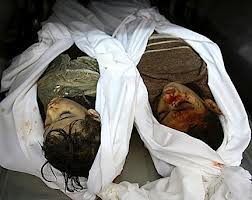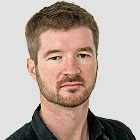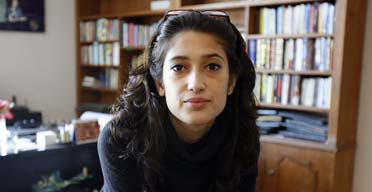Watching him receive a verbal pistol-whipping from Jeremy Paxman at a London press conference this week, it was hard not to feel sorry for Bilawal Bhutto Zardari, the 19-year-old heir to Pakistan’s most perilous throne. Did the Oxford fresher really think he was up to the job of heading the Pakistani opposition, even nominally? At home in Pakistan, critics found other faults. “He’s not a Bhutto, really, he’s a Zardari,” muttered a party loyalist, a few days after she was assassinated. “We need a true Bhutto to do the job.”
Bilawal may be happy to slip back to Oxford, secret service bodyguards in tow, for another three years. But in Karachi there is another young Bhutto who, if dynasty is your game, seems perhaps better qualified to lead the Pakistani opposition.
Fatima Bhutto is clever, sassy and savours the salty taste of Pakistani public life. She has two books under her belt, writes a punchy newspaper column, and, as a close lieutenant to her vote-seeking mother, is a politician in training. There are some obvious parallels between Fatima and Benazir 30 years ago. Both their lives have been shaped by the untimely and violent deaths of their fathers; both are headstrong, with deep reserves of charm and, when called for, a sense of entitlement. Both are western-educated. The physical resemblance can also be striking. One television interview this week showed Fatima in profile before a portrait of a young Benazir – the same long nose, wide forehead and calm bearing were evident.
Fatima is 25 and eligible to run for public office. (Bilawal must wait another six years.) And for what its worth, she even has the endorsement of Jemima Goldsmith. “At least she has some work experience,” wrote Goldsmith, who was once married to cricket star Imran Khan, in last week’s Sunday Telegraph. (Goldsmith’s expertise in Pakistan, which she left several years ago, was less clear.)
But Fatima says she has no political ambition and, at any rate, is unlikely to eclipse her famous cousin anytime soon. The reasons spring from a half-forgotten chapter of the Bhutto history. It is a story written in broken bloodlines that illuminate the Greek tragedy that this extraordinary South Asian dynasty has become.
Last October, two nights before Benazir was due to return from exile in Dubai, I went to see Fatima and her Lebanese stepmother Ghinwa at their home in Clifton, Karachi’s oldest and plushest suburb. They offered a simple dinner – pizza in the box – with apologies: they had just returned from their ancestral home in Larkana, 200 miles to the north, further up the Indus river, where they had been visiting prisoners in the local female jail.
We ate in the upstairs lounge of 70 Clifton, the sprawling house built by Fatima’s great-grandfather, Shah Nawaz, in 1954. It reeked of history. Benazir paced these corridors during her detention under the military dictator Zia-ul- Haq in the 70s and 80s. In the garden in 1986, she married Asif Zardari, a polo-playing society lad. Later Benazir would relinquish the house to her brother Murtaza – Fatima’s father – but was said still to covet her father Zulfikar’s fine library downstairs, rumoured to hold an extensive collection of books about his hero, Napoleon.
That night the city was zinging with excitement. For the first time in years the streets were plastered with Benazir posters, and yahooing men on motorcycles zipped through the traffic, honking their tinny horns. But the gate of 70 Clifton had a lone, defiant poster of Murtaza, who died in a hail of police gunfire in still disputed circumstances in 1996. Since then Fatima and Ghinwa have held Benazir “morally responsible” for his death. The bitterness was palpable and public.
Over dinner, the pair were cheerless at the prospect of her aunt’s imminent return. “If she didn’t sign the death warrant, then who had the power to cover it up? She did,” said Fatima indignantly. In support of her case she cited dead-end investigations, dodgy policemen and the mound of court papers and other testimony about her father’s death that she had collected fastidiously in the office next door.
Ghinwa, with a shock of black curls and a supply of long, thin cigarettes, added: “The more there are delays, the more it incriminates those who encouraged those delays.”
The origins of the feud stretch back to 1979 and the epochal event that traumatised Pakistan’s political psyche and, ultimately, split the Bhutto clan. After the family patriarch Zulfikar Ali Bhutto, a charismatic but flawed prime minister, was hanged by Zia, the military dictator who had deposed him two years earlier, his children scattered. Benazir stayed at home in Pakistan, enduring harsh imprisonment, looking after their ailing mother, Nusrat, and tending to the persecuted People’s party that would rise from the ashes after Zia’s death nine years later. But Zulfikar’s sons, Murtaza and Shah Nawaz, took a different path.
Young, brash and angry, they started Al Zulfikar, or the Sword, an armed movement that sought to overthrow Zia. The revolutionaries shot to fame in 1981 with the hijacking of a Pakistan International Airlines jet that was forced to land in Kabul, where the Bhutto brothers lived in exile under the communist government. The precise details of what unfolded are still disputed, and Murtaza’s family claims that he was not involved in the plot (but did act as a negotiator). But a young army officer aboard the plane was executed, some Bhutto supporters were released from jail and flown to Libya, and the brothers became A-list enemies of the powerful military establishment.
Along the way, the Bhutto brothers married two Afghan sisters, the daughters of an Afghan foreign affairs official. Murtaza had a daughter, Fatima, with his wife Fauzia, but they divorced three years later. The brothers flitted to Tripoli then to Europe, sheltering with sympathetic governments. But in 1985 exile took a dark turn when Shah Nawaz, the younger brother, was poisoned during a family holiday in the south of France. The Bhuttos blamed Zia, the CIA, or both.
Murtaza and Fatima found a home in Syria where they met Ghinwa Itoui, a Lebanese woman who had fled the war at home and was giving ballet classes in the basement of a Catholic church. Fatima was among her students. Murtaza and Ghinwa fell in love and married in 1989. At home, Murtaza faced serious allegations, but his daughter idolised him. “He was a wonderful father. We had so much fun,” she said, recalling one day when he whipped her out of school for an impromptu excursion to the snow-capped Syrian mountains.
The split came in 1993 when Murtaza ended his 16-year-exile. Sparks flew with Benazir, then elected prime minister for the second time. Murtaza wanted to assume a senior role in her party, possibly the leadership – a demand in keeping with the patriarchal assumptions of the Sindh province’s landlord classes. Benazir was having none of it. The rows multiplied, the rift grew deeper, and Murtaza formed a splinter party, which had little success.
It came to a tragic climax three years later, in 1996, when Murtaza, who used to travel with an entourage of armed bodyguards, got into a gunfight with some police, who were ostensibly trying to arrest him. His death rocked Pakistan – another Bhutto dead – and Benazir was said to be distraught. “Our paths were different but our blood is the same,” she said. Her government fell six weeks later.
But the grief-stricken Fatima and her mother came to believe that Benazir or her husband, Zardari, had a hand in the killing. Stories circulated that Zardari had had a fight with Murtaza in which his moustache was shaved off – an immense insult. Benazir believed that the shooting had been orchestrated by her enemies. “Kill a Bhutto to get a Bhutto,” she told friends. But as with so many political deaths in Pakistan, the truth has never emerged.
Fatima is at great pains to distance herself from her aunt. She did her masters at London’s School of African and Oriental Studies, not Oxford, she points out, and instead of heading a debating society, she wrote her dissertation on the resistance movement to Zia. She published a book of poetry, Whispers of the Desert, at the precocious age of 15, followed in 2006 with a collection of stories about the 2005 earthquake that killed 73,000 people in Kashmir and North West Frontier Province. “The comparisons are largely cosmetic,” she said. “In terms of political ideology, what we read, how we think, we are very different. I don’t think that I’m anything like her.”
Her weekly column touches on social and political issues. She won plaudits for her reports of the 2006 war in Lebanon – she was in the country when the fighting started – and keeps a poster of Hizbullah leader Hassan Nasrallah on the door of her office. She yearns to visit Kabul, her birthplace, but her mother discouraged it on grounds of danger.
Benazir clearly loved her niece – her autobiography Daughter of the East has several warm references – but Fatima believes she tried to split the family apart. Benazir disparaged Ghinwa as a “Lebanese belly dancer”, and six months after Murtaza’s death persuaded Fatima’s biological mother, Fauzia, to return to Karachi to seek parental custody. “It was just vulgar and crude,” recalled Fatima. “I was in biology class in ninth grade. Then the principal came and said, ‘There’s a woman here who claims to be your mother.'” Fatima locked herself in the nurse’s office as the press swarmed outside. A few years later, Fauzia launched an unsuccessful court bid for custody. She later returned to the US. “It sounds like a soap opera but unfortunately it was very real,” said Fatima. “It felt very orchestrated and designed to humiliate.”
But she was also keen to distance herself from her aunt’s shadow. She didn’t like her grievances being aired as a “catfight”, she said. “As someone who cares about this country, I’m upset by what’s happening. The fact that she’s my aunt is just a footnote … In this country, politics has become entertainment. It’s become sleaze, quick and tawdry, because we don’t want to talk about things that really matter.”
What mattered, she said, was her politics. As she spoke, Ghinwa lit her cigarettes with a box of personalised matches. “For the house of 70 Clifton,” read the packet. The box had been printed by a supporter from Ghinwa’s political vehicle, the Pakistan People’s party – Shaheed Bhutto (“Bhutto the martyr”), which she kept alive after her husband’s death. But the flame is barely alive. PPP-SB failed to win even one provincial seat at the last elections. After Benazir’s return, and the suicide bombing that killed 140 people, I met Ghinwa again. The rift was raw as ever.
“I hoped that she wouldn’t die, of course. I think it will be a bigger punishment for her to live. I feel terrible about all those people, and angry for exposing them like that,” she told me.
In life, Benazir was touchy about allegations that she bore any responsibility for Murtaza’s death. Instead, she blamed the powerful intelligence services for engineering the killing to split her family. If she was right, the strategy worked spectacularly well. Last month Fatima sent around a link to a YouTube clip of a television interview. It showed Benazir being aggressively questioned about Murtaza’s death, breaking into tears and storming out of the studio. “Her reaction is amazing,” wrote her estranged niece in an acerbic tone.
Then, two weeks ago, everything changed. In the wake of Benazir’s death I found Ghinwa, Fatima and her 17-year-old brother, Zulfikar Ali junior, at the Bhutto ancestral home in Larkana, a 20-minute drive from Benazir’s grave. The town centre was still smouldering after the violent reaction to the assassination, and a charred vehicle was parked outside the house. Fatima was shrouded in a black veil, her face was drawn, her cheeks were stained with tears. “It’s been a real shock,” she said.
Fatima and her mother had been on the election trail, canvassing door to door, when the news broke. She went home and wrote a bittersweet farewell to Benazir for the News. The prose was staccato, the sentiment raw. “My aunt and I had a complicated relationship. That is the sad truth,” it started. She remembered fondly that they used to read children’s books together, shared a passion for sugared chestnuts and were troubled by the same sort of ear infections. “In death, perhaps there is a moment to call for calm. To say enough … We cannot, and will not, take this madness any more.”
Yesterday Fatima was back in Karachi, still receiving condolences. “My first thought was that it was just too familiar. It felt like we had been through this too many times before,” she said by phone. “When I heard that she had been shot in the neck, I thought of my father. The bullet that killed him was also fired into his neck, though at point blank range. It seems like every 10 years we bury a Bhutto killed violently and way before their time.”
She had not changed her mind about her father’s death, she said. “Her government never adequately explained its role. But now that she’s gone …” She paused. “We’ll remember her differently.”
But the Bhutto legacy is not at rest yet. Mumtaz Bhutto, the self-described head of the Bhutto clan, stirred the pot recently in suggesting that Fatima’s brother, Zulfikar Ali, is the real heir to Benazir’s title. But he is highly unlikely to take on the mantle, and Mumtaz’s comments may be a product of his longstanding rivalry with Bilawal’s father, Zardari. They are also a product of a bygone age – the succession of Bilawal and the bypassing of the bloodline proves that Pakistan opposition politics are about Benazir more than Bhutto.
Soon Fatima and her mother will return to Larkana, to continue the campaign for elections in five weeks’ time. “I don’t believe in birthright politics,” she said. “I don’t think, nor have I ever thought, that my name qualifies me for anything. I am political through my writing. I have no interest in parliamentary politics for now. I’m too young. There’s a lot to learn”.
Ref












